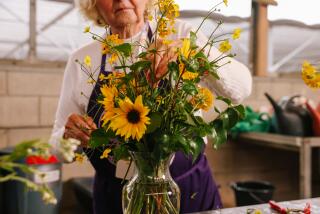Holiday Greens, Winter-Blooming Annuals, Italian Broccoli
- Share via
The cut branches of Pittosporum tobira (illustrated above) and dark-green podocarpus are unexcelled greens for holiday wreaths and decorations, because they keep without water. Holly, on the other hand, does not do well once cut. A wreath made entirely of holly will be short-lived here. If you want to use holly for color, use it as an accent only, inserting a few pieces in your wreath and replacing them once they start to appear dry.
Winter-blooming annuals will respond now to fertilizer, especially to the nitrogen that it contains. At this time of the year, when the soil is colder, the bacteria that produce nitrogen are dormant. With fertilizer, especially in fast-acting liquid form, the results can be remarkable. Try it on primroses, cyclamen, snapdragons, Iceland poppies, violas and pansies.
End-of-the-season bulbs are usually good buys about now. But freesias and Dutch irises are getting dried out, so skip the ones that don’t look plump and firm. Daffodils hold up best, but make sure to examine them for basal rot. If the basal plate or lower portion of a bulb is soft, avoid it. South African bulbs, such as freesias, ixia, sparaxis, tritonia, babiana and lachenalia, are among those best adapted to our climate. Ranunculus and anemones can also be planted this late.
‘Cindy’ is a new butter-lettuce variety that attains harvest stage two weeks earlier than other butter-lettuce types. The heads are compact, making this vegetable ideal for container gardening. Seeds for ‘Cindy’ are available from Park Seed Co., Highway 254 N., Greenwood, S.C. 29647.
Although broccoli raab, which resembles regular broccoli and has similar cultural requirements, is not well-known in the Southland, it is highly prized in parts of the East. Also known as Italian broccoli, it is grown and savored for its slender stems, tender leaves and dime-size heads. Unlike broccoli, Italian broccoli does not form a large central head; it is a non-heading variety that produces loose, open stems and leaves, all of which are edible. When available at local specialty produce markets, it commands a handsome price--as much as $2.98 for a small bunch. Seeds are available by mail from Harris Seed Co., 3670 Buffalo Road, Rochester, N.Y. 14624, which offers a free catalogue.






